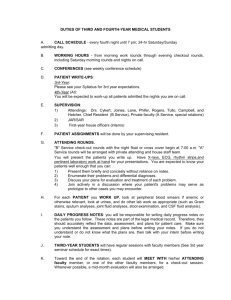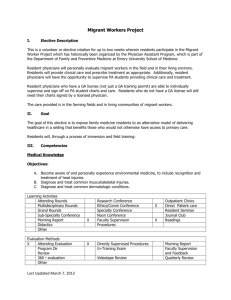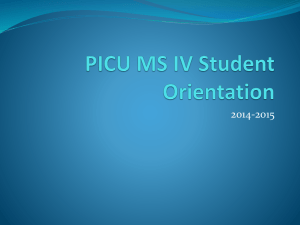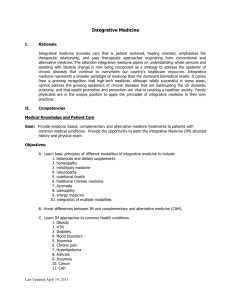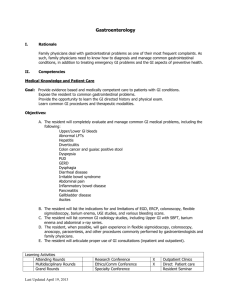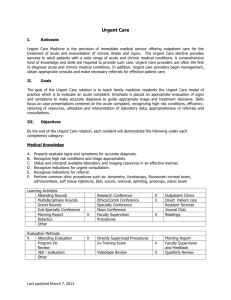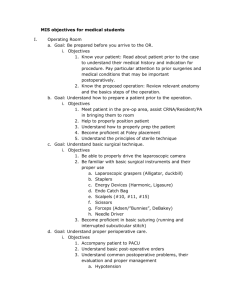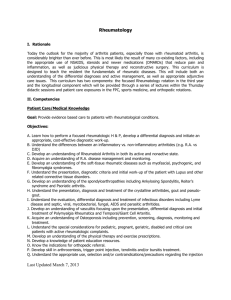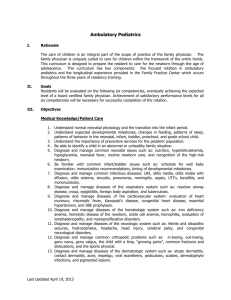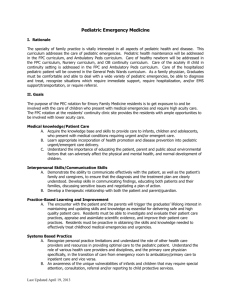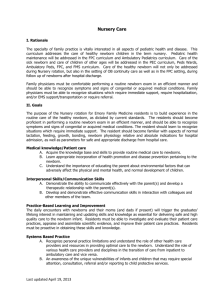Urology - Department of Family & Preventive Medicine
advertisement
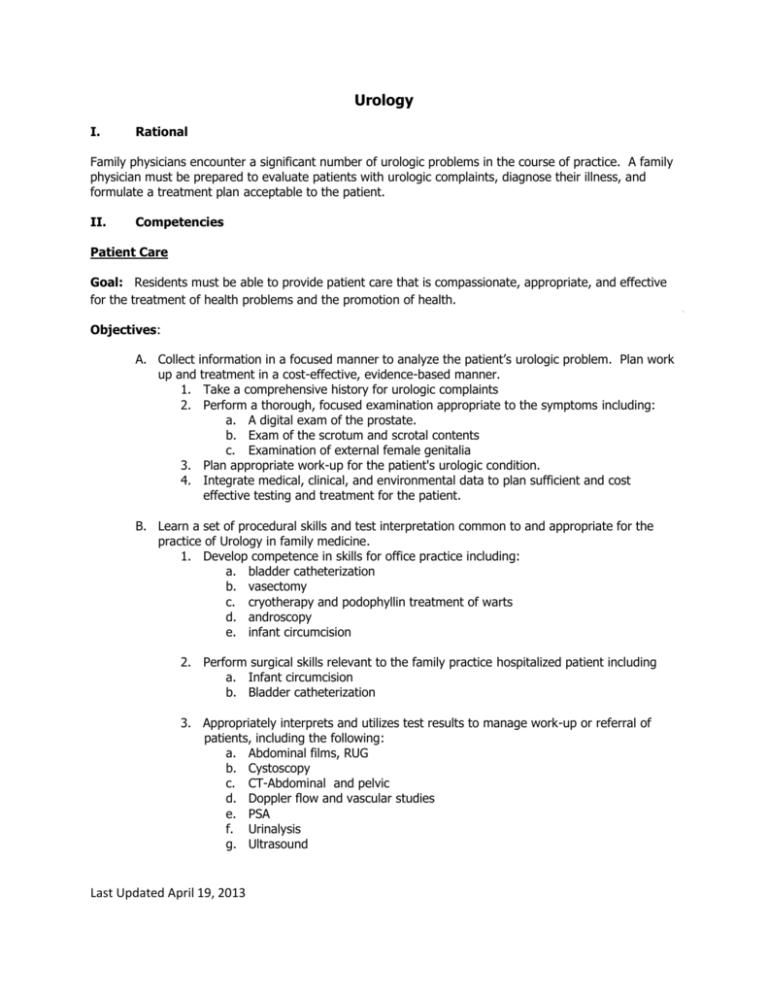
Urology I. Rational Family physicians encounter a significant number of urologic problems in the course of practice. A family physician must be prepared to evaluate patients with urologic complaints, diagnose their illness, and formulate a treatment plan acceptable to the patient. II. Competencies Patient Care Goal: Residents must be able to provide patient care that is compassionate, appropriate, and effective for the treatment of health problems and the promotion of health. Objectives: A. Collect information in a focused manner to analyze the patient’s urologic problem. Plan work up and treatment in a cost-effective, evidence-based manner. 1. Take a comprehensive history for urologic complaints 2. Perform a thorough, focused examination appropriate to the symptoms including: a. A digital exam of the prostate. b. Exam of the scrotum and scrotal contents c. Examination of external female genitalia 3. Plan appropriate work-up for the patient's urologic condition. 4. Integrate medical, clinical, and environmental data to plan sufficient and cost effective testing and treatment for the patient. B. Learn a set of procedural skills and test interpretation common to and appropriate for the practice of Urology in family medicine. 1. Develop competence in skills for office practice including: a. bladder catheterization b. vasectomy c. cryotherapy and podophyllin treatment of warts d. androscopy e. infant circumcision 2. Perform surgical skills relevant to the family practice hospitalized patient including a. Infant circumcision b. Bladder catheterization 3. Appropriately interprets and utilizes test results to manage work-up or referral of patients, including the following: a. Abdominal films, RUG b. Cystoscopy c. CT-Abdominal and pelvic d. Doppler flow and vascular studies e. PSA f. Urinalysis g. Ultrasound Last Updated April 19, 2013 C. Learn screening for risk and prevention counseling for urologic diseases a. Tracks family history of prostate disease b. Counsels patient on and utilizes current screening guidelines c. Assists patients in identifying environmental or substance abuse risks that relate to disease development. Learning Activities: x Attending Rounds x Multidisciplinary Rounds x Grand Rounds Sub-Specialty Conference Morning Report Other Evaluation Methods x Attending Evaluation x Program Director Review x x Research Conference Ethics Committee Conf Specialty Conference Noon Conference Faculty Supervision Directly Supervised Procedures In-Training Exam x x Outpatient Clinics Direct Patient Care Resident Seminar Journal Club Critical Appraised Topics Morning Report x Faculty Supervision and Feedback 360' Evaluation with nursing personnel, patients Medical Knowledge Goal: Resident will acquire knowledge required to prepare the family physician to evaluate and appropriately refer urologic patients, to properly advise and support their patients undergoing a procedure, and manage these patients in the pre-, peri- and post-operative periods. Objectives: A. Develop a knowledge base of surgical problems including skillful at early recognition of symptoms and initial diagnostic work-up of: 1. nephrolithiasis 2. pyelonephritis 3. hematuria 4. cystitis 5. urinary incontinence 6. urinary retention 7. urethritis 8. varicoceles 9. spermatoceles 10. hernias 11. epididymitis 12. testicular torsion 13. testicular masses 14. prostatitis 15. BPH 16. prostatic cancer 17. neoplasm of the urinary tract Last Updated April 19, 2013 18. 19. 20. 21. 22. 23. 24. hematospermia balanitis/phimosis undescended testicles hydroceles cryptorchidism ureterovesical reflux urinary tract infections B. Identify when the above problems necessitate urologic consultation or referral, especially urgently or emergently C. Develop skills in shared pre-, intra-, and postoperative management of patients D. Evaluates operative risk and risks of anesthesia in their patients including those with the following conditions: 1. 2. 3. 4. 5. 6. 7. 8. 9. 10. 11. 12. 13. 14. 15. 16. Asthma Cerebrovascular disease Coronary Artery Disease Congestive Heart Failure COPD Diabetes Elderly patient Endocrine disorders Hepatic disease HTN lmmune suppressed Obesity Pregnancy Prophylactic antibiotic use Renal insufficiency Thromboembolic disease history or increased risk conditions E. Serves as first assistant for common general urologic procedures. F. Manages patients post-operatively in cooperation with the urology residents and faculty, including the following problems: 1. 2. 3. 4. 5. 6. 7. 8. 9. 10. 11. 12. 13. Atalectasis Fevers Fluid management Hemorrhage Ileus Indications and management of transfusions and transfusion reactions Nosocomial infections Wound infections Nausea Nutritional support during the recovery period Pain control Thromboembolic disease Urinary retention Last Updated April 19, 2013 Learning Activities: x Attending Rounds x Multidisciplinary Rounds x Grand Rounds Sub-Specialty Conference Morning Report Other Evaluation Methods x Attending Evaluation x x x Program Director Review Research Conference Ethics Committee Conf Specialty Conference Noon Conference Faculty Supervision Directly Supervised Procedures In-Training Exam x x Outpatient Clinics Direct Patient Care Resident Seminar Journal Club Critical Appraised Topics Morning Report x Faculty Supervision and Feedback 360' Evaluation with nursing personnel, patients Practice-Based Learning and Improvement Goal: The resident should develop skills in acquiring, analyzing, and applying medical knowledge to patient care. Further, the resident will develop the ability for self-analysis and quality improvement to optimize patient outcomes. Objectives: A. Analyze practice experience and perform practice-based improvement activities using a systematic methodology. B. Locate, appraise, and assimilate evidence from scientific studies related to their patients' health problems. C. Obtain and use information about their own population of patients and the larger population from which their patients are drawn. D. Apply knowledge of study designs and statistical methods to the appraisal of clinical studies and other information on diagnostic and therapeutic effectiveness. E. Use information technology to manage information, access on-line medical information; and support their own education. F. Facilitate the learning of students and other health care professionals. G. Learn to incorporate health promotion and disease prevention into patient care. H. Use evidence-based medicine, evaluation of available evidence, and use of best-available evidence at morning report meetings and during routine clinical care Learning Activities: x Attending Rounds x Multidisciplinary Rounds Grand Rounds Sub-Specialty Conference Morning Report Other Evaluation Methods Last Updated April 19, 2013 x Research Conference Ethics Committee Conf Specialty Conference Noon Conference Faculty Supervision x x Outpatient Clinics Direct Patient Care Resident Seminar Journal Club Critical Appraised Topics x Attending Evaluation x x Program Director Review x Directly Supervised Procedures In-Training Exam Morning Report x Faculty Supervision and Feedback Quality improvement project Interpersonal and Communication Skills Goal: Residents must be able to demonstrate interpersonal and communication skills that result in effective information exchange and teaming with patients, their patients families, and professional associates. Objectives: A. Develop patient sensitive skills for interviewing that allow accurate, and complete collection of information regarding symptoms, the family and the community that affect the patient's health and care. B. Develop skills in communicating results to patients, their families, other health care providers. C. Develop skills in educating patients and their families, in dealing with sensitive issues for patients and families, and in negotiating a plan of investigation and treatment with the patient and family. D. Develop professional relationships with co-workers, consultants, ancillary staff and other professionals to enable assembling of health care teams and mobilization of community resources to optimize care of the patient. E. Develop an understanding of the role of the family medicine consultant, and is able to support the patient through the process of consultation, medical evaluation, treatment, rehabilitation and long- term care. F. Use professional language and demeanor when communicating with other residents, with Family Medicine attending physicians, with physicians from other services, with non-physician clinical staff, with non-physician non-clinical staff, and with patients and their families. G. Create and sustain a therapeutic and ethically sound relationship with patients. H. Use effective listening skills and elicit and provide information using effective nonverbal, explanatory, questioning, and writing skills. I. Work effectively with others as a member or leader of a health care team or other professional group. Learning Activities: x Attending Rounds x Multidisciplinary Rounds Grand Rounds Sub-Specialty Conference Morning Report Other Evaluation Methods x Attending Evaluation x Program Director Review x x Research Conference Ethics Committee Conf Specialty Conference Noon Conference Faculty Supervision Directly Supervised Procedures In-Training Exam 360' Evaluation with nursing personnel, patients Last Updated April 19, 2013 x x Outpatient Clinics Direct Patient Care Resident Seminar Journal Club Critical Appraised Topics Morning Report x Faculty Supervision and Feedback Professionalism Goal: Residents must demonstrate a commitment to carrying out professional responsibilities, adherence to ethical principles, and sensitivity to a diverse patient population. Objectives: A. Develop a personal ethic for patient care and care decision-making 1. Utilize compassion when working with the patient and family under stress. 2. Assist the patient in making a well-informed decision about their medical care. 3. Realistically appraise a patient's recovery potential and life quality depending on course of action selected B. Learn resources for personal education and develops a plan for ongoing education 1. Identify skills and procedures needed for future practice intentions and selects electives or seeks patient care experience in areas of need 2. Identify sources of information for future continuing education C. Recognizes strengths and weaknesses of knowledge and skills in self and others 1. Select consultants for competence and excellence in their area of expertise 2. Utilize consultants early in areas of weakness in knowledge and skill Learning Activities: x Attending Rounds x Multidisciplinary Rounds Grand Rounds Sub-Specialty Conference Morning Report Other Evaluation Methods x Attending Evaluation x Program Director Review x 360' evaluations x x x x Research Conference Ethics Committee Conf Specialty Conference Noon Conference Faculty Supervision Directly Supervised Procedures In-Training Exam x x Outpatient Clinics Direct Patient Care Resident Seminar Journal Club Critical Appraised Topics Morning Report x Faculty Supervision and Feedback Systems Based Practice Goal: Residents must demonstrate an awareness of and responsiveness to the larger context and system of health care and the ability to effectively call on system resources to provide care that is of optimal value. Last Updated April 19, 2013 Objectives: A. Understand how their patient care and other professional practices affect other health care professionals, the health care organization, and the larger society and how these elements of the system affect their own practice. B. Know how types of medical practice and delivery systems differ from one another, including methods of controlling health care costs and allocating resources. C. Practice cost-effective health care and resource allocation that does not compromise quality of care. D. Advocate for quality patient care and assist patients in dealing with system complexities. E. Know how to partner with health care managers and health care providers to assess, coordinate, and improve health care and know how these activities can affect system performance. Learning Activities: x Attending Rounds x Multidisciplinary Rounds Grand Rounds Sub-Specialty Conference Morning Report Other Evaluation Methods x Attending Evaluation x Program Director Review x x x x Research Conference Ethics Committee Conf Specialty Conference Noon Conference Faculty Supervision Directly Supervised Procedures In-Training Exam x x Outpatient Clinics Direct Patient Care Resident Seminar Journal Club Critical Appraised Topics Morning Report x Faculty Supervision and Feedback Other III. Instructional Strategies (see above) A. B. C. D. E. F. IV. Evaluation Strategies (see above) A. B. C. D. E. V. Observation of preceptor Assessment of actual patients in preceptor’s office Management of actual patients in continuity clinic Case discussions Ambulatory care conference Associated rotations: family medicine, pediatrics, emergency medicine, gynecology, internal medicine, and obstetrics Observation of resident by urology preceptor Observation of resident by clinic preceptor Procedure / diagnosis documentation Attendance at conference series End of rotation evaluation Implementation Methods Location: The rotation will be at Midtown Urology & Surgical Center,128 North Avenue, NE, Suite 100 Atlanta, GA 30303 with Dr. Jennelle Foote. Last Updated April 19, 2013 Contact: The resident is expected to call Foote’s office the day prior to determine where and when they are expected and to confirm the anticipated schedule regarding the family practice center time. If patient assignments are already clear, the resident should plan on discussing the patients with the residents who is leaving, or arriving early to review off- service notes. Mon Tues Wed Thurs Fri AM Midtown FPC FPC Didactics Midtown PM Midtown FPC FPC FPC Midtown Family Practice Center: One to two half days per week. Call/Vacation: Call will be with the FMS at Emory University Midtown Hospital. Vacation not permitted. Supervision: Residents will be supervised by Dr. Jenelle Foote. Residents should document all procedures in their residency passport. Conferences: The resident is expected to attend Family Medicine Conferences and Urology Grand Rounds. Suggested Readings: AFP Monographs (Male Genitourinary Conditions #361, Female Genitourinary Conditions #314) Last Updated April 19, 2013
